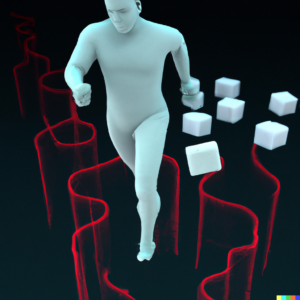Sugar is the biggest enemy in our diets. And, although you might think that this statement is too dramatic, it’s actually true. We all know that sugar is bad for us, but we don’t realize just how much damage it can do to our bodies until we cut it out completely. Here are some of the most common ways that sugar messes with your metabolism and makes you sick:
Sugar can make your metabolism sluggish.
Sugar is a source of energy for the body.
That’s why it’s so appealing to us, right? It helps wake us up in the morning, keeps us going during long days, and even makes an appearance at our favorite holiday parties as a sweet treat that we can’t resist. But how does it do all this? And what’s so bad about eating too much sugar?
Sugar is a carbohydrate—one of three kinds found in food: glucose, fructose and galactose. These are all used by cells for energy; but unlike other types of carbohydrates (like those found in whole grains), sugar breaks down very quickly into glucose which enters the bloodstream quickly. This can be good if your body needs quick energy—but eating too many sugary foods can cause your blood sugar levels to spike excessively high (a condition known as insulin resistance). When this happens over time you end up with higher levels of insulin circulating through your blood stream which causes more fat storage around your waistline (abdominal obesity) as well as other health problems like diabetes or high cholesterol
High sugar consumption is linked to heart disease, can increase the risk of high blood pressure and bad
cholesterol, and has been associated with cancer.
When you eat too much sugar, it causes your blood sugar levels to spike. This in turn leads to the release of insulin, an important hormone that helps regulate blood glucose levels. Over time, a high intake of refined carbohydrates may cause your body to become less sensitive to insulin. This condition is known as insulin resistance and can lead to prediabetes, diabetes or even metabolic syndrome—a cluster of conditions such as high blood pressure and excess fat around the waist that increase risk for heart disease and type 2 diabetes.
Insulin resistance also increases your risk for heart disease because it increases triglyceride levels in your blood—another contributor toward atherosclerosis (clogged arteries). Your body responds by producing more LDL cholesterol particles that deposit on artery walls, eventually leading them to narrow or harden over time due to fatty deposits called plaque buildup.[7]
Although there are many other factors involved in cardiovascular disease risk, including smoking and genetics,[8] studies show that reducing added sugars can help reduce these risks while still enjoying sweet foods.[9][10]
It takes 21 days for your body to break its sugar addiction.
It’s important to keep in mind that breaking your sugar addiction can be difficult. There will definitely be times when you feel like giving up, but I promise it’s worth the effort. Here are a few tips that can help you get through this process:
- Make sure you have plenty of healthy food on hand so that when cravings strike (and they will!), there is something healthy for you to eat instead of candy or cookies.
- Drink lots of water throughout the day and avoid sugary beverages like soda, because they are full of empty calories that lead directly to weight gain!
- If you want a sweet treat once in awhile, go for dark chocolate because it has more antioxidants than milk chocolate does—plus it tastes better anyway!
Sugar is everywhere.
Sugar is in just about everything you eat. Even things that don’t seem to have sugar in them can have it, like bread and sauces. If you’re eating sweetened cereal for breakfast or snacking on granola bars for a midday treat, then you probably don’t realize how much sugar has crept into your diet.
Your body eventually becomes resistant to the effects of insulin when too much sugar is consumed over time. This means that there will be more glucose in your blood than necessary and the excess will be stored as fat instead of being used for energy needs or other vital functions. The result? You gain weight!
Cutting sugar out of your diet will leave you feeling better and improve your health.
Cutting sugar out of your diet will leave you feeling better and improve your health. Sugar is addictive, and it’s everywhere—even in things like salad dressing and ketchup. You might not think that eating a lot of sugar would be bad for you, but it messes with your metabolism by raising triglycerides (a form of fat) in the bloodstream and lowering HDL cholesterol (the good kind). And if that weren’t enough to convince you to cut back, sugar can also cause heart disease, high blood pressure and bad cholesterol.

